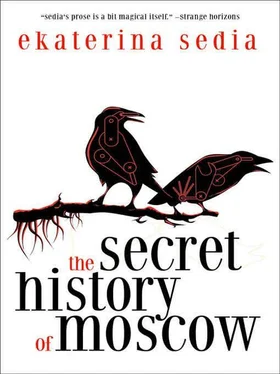"I'm with the police,” Yakov said. “We got a report of a missing person?"
"My mom,” the girl said, stubbornly staring out of the window. Her voice wavered a bit, and with a sinking heart Yakov realized that she'd been crying.
He never knew what to say to the crying people, especially the younger ones. It made him panic and make promises he couldn't possibly keep, just to stem the tears and the heartbreak. “Please,” he said. “Don't cry. We'll find your mom. But you'll have to help me there, all right?"
The girl rubbed her face with her palm angrily, and shot him a smoldering look, furious that he'd seen her like this, red-eyed and snot-nosed. He pitied her for her grief and for her plain face and sharp nose, for her thin mousy braids, for her obvious awkwardness.
"When did you last see her?” Yakov asked, and sat down at the table though no invitation was forthcoming.
"Friday morning,” the girl said. “She went to work but she didn't come back."
"Where does she work?"
"At the meat processing plant across the railroad tracks.” The girl pointed. “Where the woods used to be. They say she didn't come to work Friday."
He wrote it down. “Do you have any relatives you can stay with meanwhile?"
"No.” She gave him a dark look from her eyes reddened with recent tears. “I can take care of myself."
He nodded. “We'll call you if we find anything. Your name is…?"
"Darya,” the girl said. “And you?"
"Yakov,” Yakov said. “If you call your local police station, just ask for me, all right?"
"All right,” the girl said, and turned back to the window.
Yakov headed for the door. There was a yelp, and he spun and ran back into the kitchen, imagining something horrible happening to the girl. Instead, he found her unharmed but pale as she pointed at something outside the window. He looked at the flock of birds winging their way toward the building, not understanding at first. And then he saw.
The birds were owls, squinting in the luminous sunlight, but circling nonetheless.
"Where did they come from?” Yakov muttered, looking over the expanse of asphalt and construction.
The owls seemed confused as well. They remained silent, and their wings, soft as down, made no noise; they were phantoms, not birds of flesh and bone, he thought. They were not real because they were not supposed to be here, had no right to exist, had no reason to fly about in daylight. Yet Darya saw them too and waved at the birds, shooing them away or inviting them closer, Yakov couldn't tell.
One of the owls split from the flock and headed directly for the window. Its eyes, huge and round and yellow, set in a white triangular face, gripped Yakov's. The bird screeched once and slammed into the windowpane, its speckled feathers erupting at the impact and showering down, falling just seconds before the dead owl's body hit the asphalt below. Darya cried.
* * * *
It was dark when he arrived at the last address, not too far from the station-he planned it that way. An older woman opened the door; her eyes were haunted. A stained and wet housecoat clung to her spindly legs, and the buttons were missing, showing a yellowing slip underneath. The woman motioned for him to come in, and he heard water rushing into the bathtub and a baby crying.
"Doing the laundry,” the woman explained. “My daughter's missing. This is her baby."
"I can wait a little,” Yakov said.
The woman nodded and disappeared down the hallway, muttering to herself and sighing. Yakov felt for her, left like this with a double burden of a missing child and care for the grandchild. He didn't dare to venture inside the apartment and waited by the door, resting his back against its smooth surface, until a lock clicked and the door shoved him into the hallway.
"I'm sorry,” the woman who entered said, and eyed him suspiciously. She was taller than Yakov and about his age; she carried grocery bags. “Are you with the police?"
"Yes,” Yakov said, resisting the impulse to sarcasm. “I'm sorry it took me so long-I'm interviewing many people today. A lot of folks seem to be missing. I think I just spoke to your mother?"
The woman nodded. “My sister disappeared two days ago."
"Where did she work?"
"She was a student, at the Pedagogical Institute. Started last year. She just had a baby."
"A boy or a girl?” Yakov asked.
The woman looked at him with a strange expression in her dark eyes. “I don't know,” she said. “I was so shaken, I never thought of asking."
The old woman reappeared, wiping her hands on the housecoat. “It's a boy,” she told Yakov, pointedly ignoring the woman with grocery bags. “Come on in, son. I'll tell you all about it."
She led him into the living room, where he sat on the collapsed couch, a spring digging into his thigh, and asked questions. Just like everyone else, the missing girl had no criminal connections and led a startlingly ordinary life. The only unusual thing was the circumstances of her disappear-ance-giving birth in the bathroom and then melting into thin air.
"And you haven't heard or seen anything?” he asked. “And are you sure the bathroom door was locked?"
"I'm sure,” the woman said. “And there wasn't anyone else, except myself, and Galina."
"And a jackdaw,” the tall woman said from the doorway where she apparently stood for some time, silent.
Man. Wings. Scottish terrier.
The old woman shook her head in exasperation. “Excuse her,” she told Yakov. “She's not-right."
There didn't seem to be anything wrong with the woman, except that at her mother's words she shrank and retreated into the hallway.
"Wait,” Yakov called. “Did you say a jackdaw?"
The woman peeked in again. “Yes. Other birds, too. And I think I know someone who can help you look. Only…"
"Stop that,” the older woman said. “You're embarrassing me."
And Galina faded from view, silently disappearing into the darkness of the apartment. She reappeared once, when Yakov was leaving, and shoved a crumpled note into his hand. “Call me at work. There's a street artist who knows something,” she whispered and fled under her mother's withering stare.
Fyodor was afraid of gypsies; when he was little, his mother used to warn him of straying too far away from the house. “Gypsies will get you,” she said. “They steal children and sell them."
Fyodor played by the porch, in its cool shadow smelling of rotting wood, and rarely wandered past the outhouse and the fence discolored by weather.
When his stepfather came to live with them, he was much less aware of the gypsy problem. “Go play outside,” he would tell little Fyodor. “What are you, stupid?"
"But the gypsies,” he tried to explain. “They'll get me."
The stepfather laughed, and gave him a shove away from the porch. “Gypsies are not dumb. Why would they steal a kid who'd fetch no more than a quarter?"
Fyodor went then, sobbing silently to himself. He hoped to run into some gypsies and to be stolen away, both to get away from the stepfather and to prove him wrong. He wandered past the fence and down the only earthen street of Vasilyevskoe, the village where he was born and lived all his life. It was just a row of one-story wooden houses and a gaggle of filthy geese fraternizing with a few disheveled chickens. He passed the only store, and then the road led him out of the village, to a small clump of pines overgrowing sandy dunes-the Barrens, too grand a name for such a little place. But it smelled of fresh pine resin, and the sun shone, and wild strawberries stained his fingers with their sweet blood.
He spent all afternoon lying on his back, melting into the heated sand and pine-scented air, swallowing sweet melancholy tears as he thought of the gypsies that would come by to steal him away into some magical and sinister land, and how sorry his mother would be-perhaps sorry enough to tell the stepfather to go away forever since it was his fault.
Читать дальше












